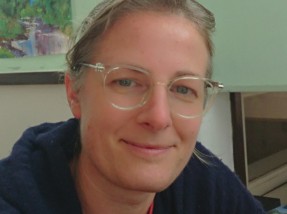People behind MiCRop: interview with Karen Kloth
2020-10-21

We talk a lot about science, but who are the people behind MiCRop and what do they do? In this series, we interview the researchers that are driving MiCRop. Today, we start with Karen Kloth, postdoc at Wageningen University in the laboratory of Entomology.
Who are you, and how did you get involved in MiCRop?
I am a postdoctoral researcher at the Laboratory of Entomology at Wageningen University. My research is centered around natural plant resistance mechanisms to herbivorous insects. I am involved in the part of MiCRop where we investigate how soil microbes help plants in dealing with above-ground attackers. It sounds like a spectacular phenomenon, that microorganisms at the root-soil interface eventually affect a caterpillar or aphid on the leaves, but there are exciting examples showing that they can rescue a plant. Yet, we know very little about it. The basic idea is, that everything is connected: microorganism, root, shoot, insect, and that plants can 'cry for help' to actively recruit beneficial microbes. In MiCRop I will help to elucidate the molecular and evolutionary mechanisms of this little ecosystem. It would be great if we can develop new strategies relying on beneficial microorganisms as a medicine against insect pests.
What are you currently working on?
Aphids and phloem are my passion. I am currently working on my personal Veni grant about phloem-located mechanisms that increase plant resistance to aphids. Aphids are part of a group of specialized insects, their mandibles are evolved into a needle-like mouth with which they feed from phloem sap. Many crops world-wide suffer from aphids and the viruses they transmit. Since the chemicals that are used to control aphids are more and more restricted by law, we need natural resistance mechanisms to make our crops less vulnerable.
What are typical tasks that you do in a week / what does a typical workday look like?
Not one day is the same. Some days I am gluing golden wires on the back of aphids to study their feeding behaviour with electrical recordings. Other days I am in the molecular lab to clone resistance genes, or sitting at my computer to analyze data, write manuscripts and talk with students.
What do you like most about the work you are doing?
I love to dive into the depth of a topic. It is like solving a huge soduko with genes, metabolites, insect data and pieces of other information. It always gives a eureka feeling when you feel you get close to the answer of a question!
Thank you for your answers, Karen! You can follow Karen also on Twitter and find her on LinkedIn and ResearchGate.
